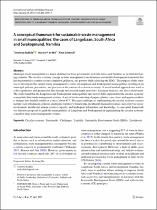| dc.description.abstract | Municipal waste management is a major challenge for local governments in South Africa and Namibia, as in other developing
countries. The circular economy concept in waste management is an alternative sustainable development framework that
has the potential to combat resource depletion, pollution, and poverty while achieving the SDGs. The purpose of this study
was to investigate the current waste management systems in Langebaan and Swakopmund municipalities resulting from
municipal policies, procedures, and practices in the context of a circular economy. A mixed method approach was used to
collect qualitative and quantitative data through structured in-depth interviews, document analyses, and direct observation.
The study found that the Langebaan and Swakopmund municipalities have not yet fully implemented the circular economy
concept into their waste management systems. A mix of waste consisting of papers, plastics, cans, tyres, and organic products
is dumped into landfills weekly at a rate of about 85%. The main challenges to implementing the circular economy concept
include: lack of technical solutions, inadequate regulatory frameworks, insufficient financial resources, lack of private sector
involvement, insufficient human resource capacity, and inadequate information and knowledge. A conceptual framework
was therefore proposed to guide the municipalities of Langebaan and Swakopmund in implementing the circular economy
concept in their waste management systems. | en_US |

